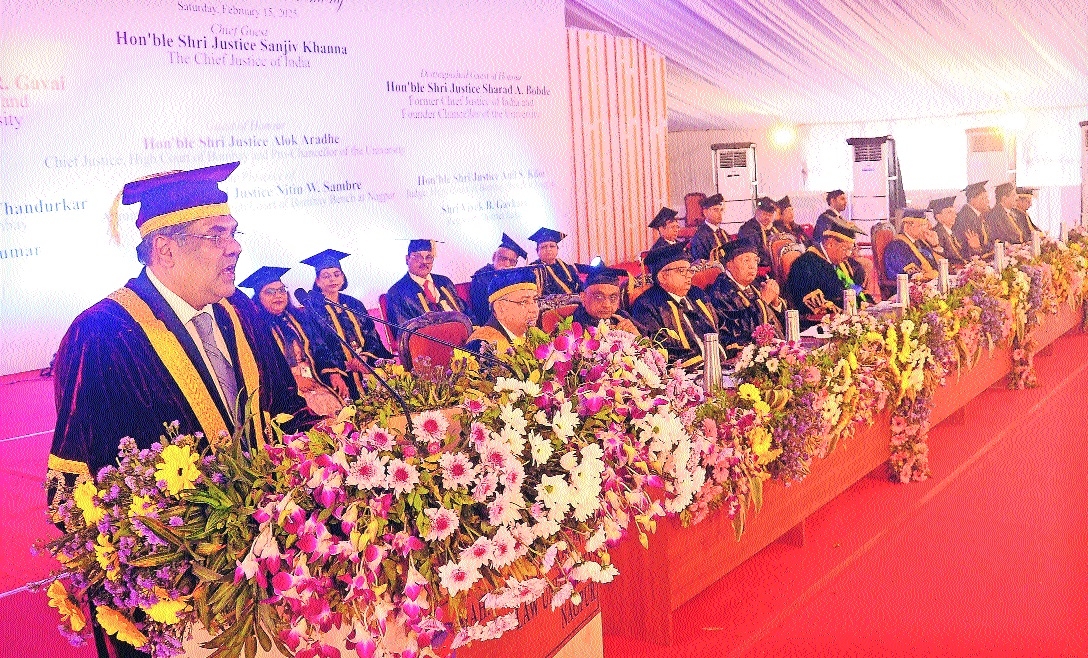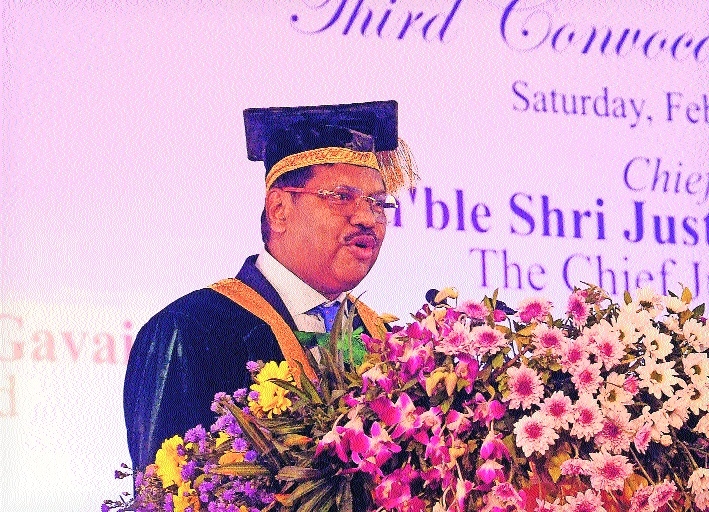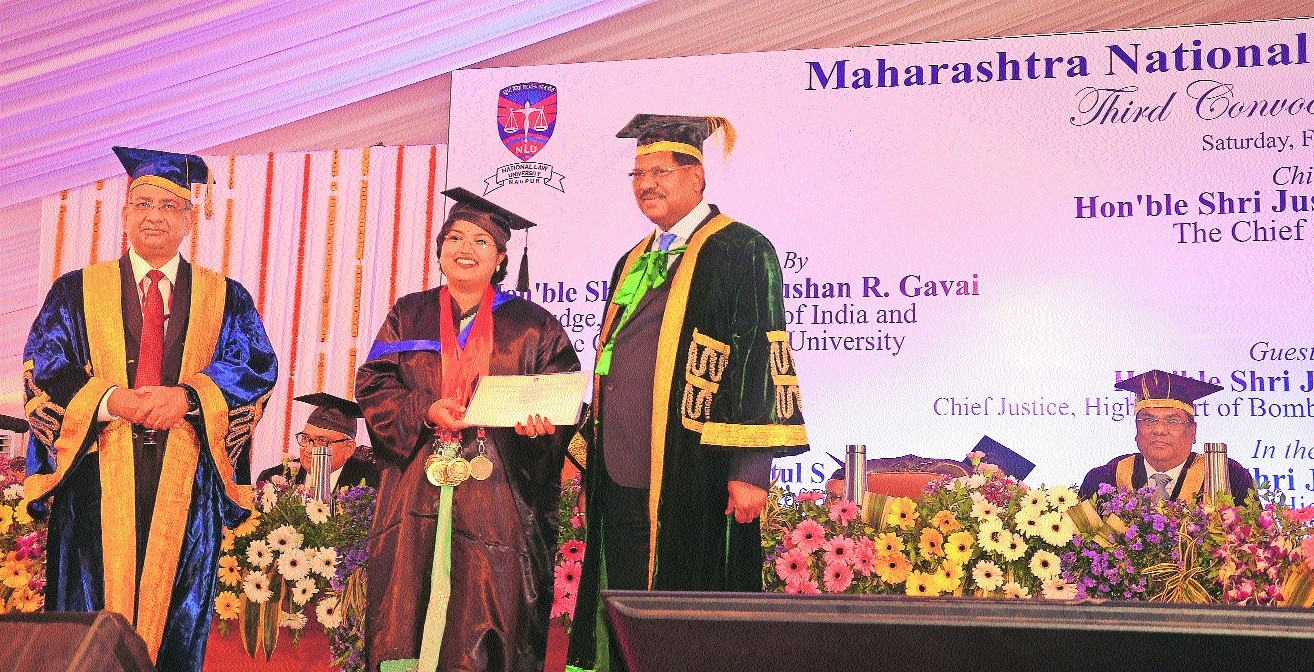MNLU shaping future of Indian judiciary: CJI Khanna
| Date :16-Feb-2025 |

Justice Sanjiv Khanna, Chief Justice of India addressing the graduating students at the 3rd convocation ceremony at MNLU, Nagpur. Other dignitaries including legal luminaries also seen on the dais. (Pics by Satish Raut)
Staff Reporter :
“Just as we stand at the geographical centre of the country, Maharashtra National Law University (MNLU), Nagpur stands as the centre of legal tradition shaping minds that will influence the cause of justice across the country,” said Justice Sanjiv Khanna, Chief Justice of India (CJI). He was addressing the students during the 3rd convocation ceremony held at MNLU’s premises on Saturday.
Justice Sanjiv Khanna was the chief guest while Justice Bhushan Gavai, Judge, Supreme Court, and Chancellor of the University, presided over the ceremony. Justice Sharad Bobde, former Chief Justice of India and Founder Chancellor of the University; Justice Alok Aradhe, Chief Justice High Court of Bombay and the Pro-Chancellor of the University; Justice A S Chandurkar, Judge, Hight Court of Bombay; Justice Nitin Sambre, Judge, Nagpur Bench of Bombay High Court; Anil Kilor, Nagpur Bench of Bombay High Court; Dr Vijender Kumar, V-C; and Vivek Gavhane, Registrar and District Judge.
At the outset, Justice Khanna and other dignitaries took part in an academic procession. As the procession marched into the convocation hall, everyone present stood up in respect. Murmurs of the gathering could be heard all around the hall, except the section where the graduating students stood.
The graduating students were then conferred with degrees and medals by the Chancellor after he declared the convocation ‘open’.
In his address to the student, Justice Khanna emphasised five key perspectives that would help them navigate highs and lows of the legal profession. These perspectives, he noted, are not just valuable to lawyers but are equally relevant to all individuals in their professional and personal journeys.
The CJI began by highlighting the importance of adaptability in the ever-evolving legal landscape. “The profession, from my experience, is just as much about unlearning as it is about learning,” he remarked.
Justice Khanna stressed that unlearning does not mean discarding knowledge but adapting it to new perspectives. He urged students to recognise that their education was not ending but merely beginning, as the responsibility of law practitioners extends beyond theoretical knowledge to real-life implications on people’s liberties and lives. He emphasised the need for cost-effective and timely justice, advocating for mediation as a powerful tool in achieving this goal.
Justice Khanna called upon the graduates to use their degrees as tools to bring social change. He acknowledged the pressing global issues of climate change, human rights, and digital privacy, stressing that the role of legal professionals extends beyond courtrooms to shaping society. “The work done for the good of society is what keeps you going,” he affirmed.
Justice Khanna reassured students that it is alright to not have everything figured out. “Passion doesn’t follow a checklist; it is about letting your destiny come to you,” he said citing example of legal luminary Nani Palkhiwala, who entered law school only because other degree programs were unavailable, and went on to become one of the most renowned lawyers in India.
Justice Khanna also stressed on the importance of self-discipline and hard work, cautioning the students against over-reliance on networking and external validation.
“Hard work might sound boring and repetitive, but nothing replaces the effort of showing up day after day,” he stated. While acknowledging the advantages of professional networking, he emphasised that true success stems from perseverance and dedication. “Harder I work, luckier I get,” he added, underscoring necessity of resilience in the legal profession.
Finally, he urged students to embrace their identity and individuality. “Be yourself. Don’t let people tell you what a lawyer should be like,” he advised, reminding the graduates that success in law has never been confined to a single personality type.
Justice Khanna’s address resonated deeply with the graduating batch, leaving them with a sense of purpose and determination as they embark on their legal careers.
Post Justice Khanna’s address, the convocation was dissolved. As the Chancellor uttered “I declare the Convocation closed,” the graduating students let out a hugh roar of hope and joy and, then, the entire hall fell silent.

There is no substitute to hard work: Justice Gavai
Highlighting stark difference between the limited opportunities available when he graduated and the vast array of options available now, Justice Bhushan Gavai, Supreme Court Judge and Chancellor of Maharashtra National Law University, said, “Back when we graduated there were hardly any options for us. But today, wide options are available.”
“Dedication, hard work, integrity, and honesty are must. With these qualities, you will not have to look back. Wherever you go, you must keep in mind that there is no substitute to hard work,” stressed
Justice Gavai.
At the outset, Justice Gavai who is poised to become the next Chief Justice of India, said, “It gives me immense pleasure to welcome CJI Sanjiv Khanna and all to this convocation. It is a great moment for students and their parents who are here to share their joy.”
“This is the only function that the CJI has accepted to attend after assuming the office,” mentioned Justice Gavai. Praising CJI Khanna’s work ethic and the positive impact of his reforms on court disposal rates, he said, “I’m sure that under his guidance, we will see many more positive changes in Indian judiciary.”
Justice Gavai shared that this would likely be his last convocation as Chancellor. He reflected on the university's development, recalling the initial 2011 request for a National Law University in Nagpur. “Going down memory lane,” he said, “I think we have got arguably the best infrastructure here.” He highlighted the university’s impressive infrastructure, including the upcoming ‘iconic’ library, and its self-sufficiency in water and electricity.
“We are 100 per cent self-sufficient as far as requirement for water and electricity is concerned,” he stated. He thanked the government and previous administrative judges for their support, and assured that remaining work would be completed soon.
He then congratulated the graduating students, noting the joy on their and their parents’ faces. He emphasised the day's significance as a turning point in their careers. Justice Gavai acknowledged the immense contribution of the legal fraternity to nation-building, citing figures like Mahatma Gandhi, Pt Jawaharlal Nehru, and Sardar Patel, whose sacrifices secured the nation’s freedom. “The air of freedom that we breathe today is due to their sacrifices,” he stated. He also recognised the profession’s continued contributions post-independence. “Even after the independence, the legal fraternity has immensely contributed to the nation.”

Tiroda’s Aditi bags top honours
Aditi Sanjay Singh Bais, a resident of Tiroda, Gondia, has emerged as the top performing student of the 2019-25 BA LLB (Hons) batch at Maharashtra National Law University (MNLU), Nagpur. Bais achieved an impressive CGPA of 8.72, earning her the prestigious Shri Hiralal Chudaman Patel Gold Medal. This medal is awarded to the student with the highest overall score in the entire graduating class. Aditi was conferred with the medal by Justice Bhushan Gavai, Supreme Court Judge and Chancellor of the University, along with six other gold medals under various categories in presence of Justice Sanjiv Khanna, Chief Justice of India; Dr Vijender Kumar, Vice-Chancellor; and other dignitaries.
“I feel so good about it,” shared Aditi. “I didn’t really expect that I would get so many medals, but with God’s grace and my parents’ support, I was able to do it.” She emphasised consistency as the key to her academic success. “I regularly attended all the lectures, even during the lockdown when most students were not attending,” she added.
Bais admitted to a long-held fascination with medals, noting her previous achievements as a topper in both her 10th and 12th standard examinations. This dedication to academics, she revealed, meant sacrificing social events. “Due to this fascination,” she explained, “I missed out on freshers' party, farewell, and all the other parties.”
Looking ahead, Bais has set her sights on serving the nation through the judicial services. She is currently preparing for the competitive examinations required for entry into this field.



